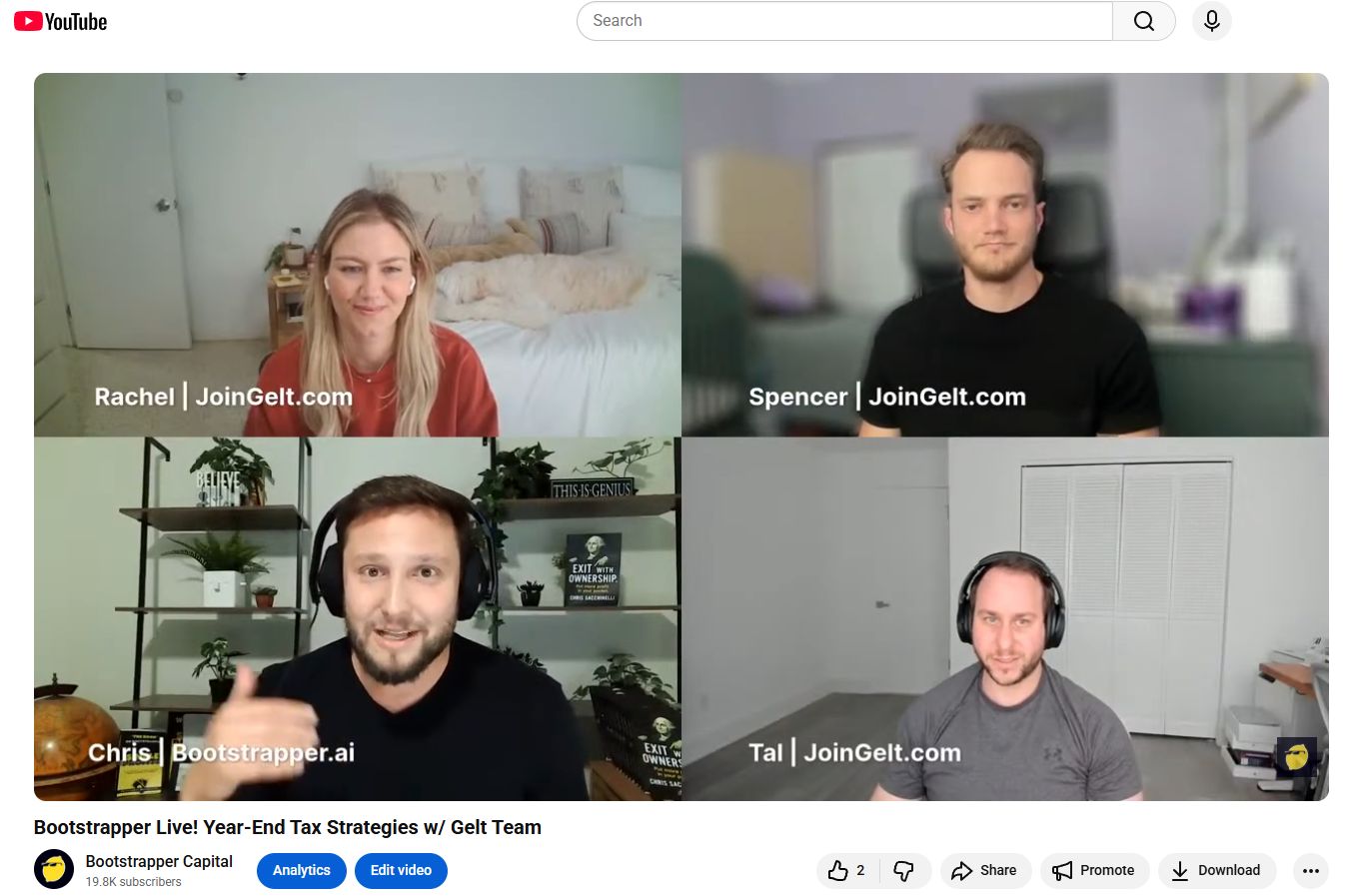- Simple Profits
- Posts
- Issue #343: Year-End Tax Tips
Issue #343: Year-End Tax Tips
🤫Don't Tell!
in partnership with
 | If you enjoy this content, then let’s connect on LinkedIn. We actively invest in B2B service and SaaS businesses who prioritize building a long-term sustainable business. |
Welcome back fellow investopreneurs!
This past week we had our friends from JoinGelt.com join us on Bootstrapper Live! and they delivered a world-class breakdown of Year-End Tax Strategies that can literally put cash back in your pocket.
Not fluffy “buy a laptop” stuff — real, high-leverage tax plays for bootstrapped business owners.
At the end of the session, the Gelt team surprised everyone with a FREE 1:1 tax strategy consultation (normally paid) exclusively for attendees…
And we’re extending that same offer to you 👇️
Want a FREE 1:1 Tax Consultation?close your year-end out right w/ Gelt |
Year-End Tax Moves
You’ve got six weeks left in 2025.
This is where most business owners don’t look at their P&L… and end up donating way too much money to the IRS.
This isn’t personalized tax advice — always work with a CPA (like Gelt) — but if you run a pass-through business (LLC, S-Corp, sole proprietor, partnership, etc.), these are the biggest levers you can still pull before December 31 to legally keep more of what you earn.
1) The Heavy Vehicle Write-Off (a.k.a. The Famous G-Wagon Deduction)
If the vehicle weighs more than 6,000 lbs GVWR (big SUVs and trucks), you can take 100% bonus depreciation in the year you buy it. That’s a massive difference from the usual “luxury vehicle” limit that caps out around ~$20K total.
What counts: Escalade, G-Wagon, Tesla Model X, Lexus GX, Expedition Max, Suburban, Grand Wagoneer, etc.
(Full lists are everywhere. No, not every SUV qualifies.)
Key points:
Only needs legit business use, not 100%.
Track mileage. You don’t have to be perfect, just reasonable.
Yes, you can finance it and still deduct the full purchase price this year.
Example: Buy a $100K vehicle, put down $10K → you still deduct $100K this year.
If you’re already profitable and need the write-off anyway, this is one of the biggest last-minute levers available.
2) Prepay Stuff You’ll Actually Use Next Year
If 2025 was a big profit year, you can pull 2026 expenses into 2025 to lower your tax bill.
Think:
Annual software subscriptions (you’ll probably use them anyway)
Ad budgets
Rent (if your landlord allows it)
Insurance
Marketing retainers, agencies, professional services
Rule to tattoo on your brain:
Don’t spend $1 to save $0.30 in tax.
Only prepay expenses you were going to buy anyway inside the next 12 months — ideally with a discount.
3) Home Office vs. Augusta Rule (Don’t Double-Dip Wrong)
Two big ways to legally make your home work for your business:
🏠 A) Home Office Deduction
Good whether you rent or own. Lets you deduct:
Part of your rent or mortgage interest
Utilities
Insurance
Repairs, etc.
Pro trick:
You can calculate it by square footage or number of rooms. The room method is often more generous.
🏡 B) Augusta Rule (Section 280A(g))
You rent your home to your own business for up to 14 days per year, tax-free.
No 1099. No reporting. Completely legal.
To do it right:
Hold legit business events (strategy day, board meeting, off-site)
Document it (minutes, dates, agenda)
Charge market rates ($300–$1,500/day depending on city)
Works only if you own the home. Doesn’t work if you rent.
⚠️ Home office and Augusta often conflict. You can’t usually take both on the same property the same way in the same year. You pick the bigger benefit.
4) S-Corp Election (Still Retroactive to Jan 1, 2025)
This one’s misunderstood on the internet. An S-Corp doesn’t save everyone money.
A correct S-Corp setup avoids self-employment tax on profits above your “reasonable salary.”
Great when done right, a disaster when done wrong.
The Gelt team’s real-world rule of thumb:
Usually not worth it below ~$130K–$150K of profit
This is profit, not revenue
And big deductions (like a $100K vehicle) can wipe out the benefit entirely
Big opportunity:
You can still elect an S-Corp retroactively to January 1, 2025 if it makes sense for your situation.
5) Harvest Your Investment Losses (The Right Way)
Don’t let dead investments just die quietly.
Two things matter here:
Capital loss harvesting
Sell losers to offset capital gains
And you can offset up to $3K of ordinary income
Section 1244 stock
Some startup/corp investments can qualify for ordinary loss treatment, up to:
$50K single
$100K MFJ
Ordinary loss > capital loss (way more valuable against high income).
Where to Focus (The Gelt Team’s Priorities)
CPA | #1 Priority | #2 Priority | #3 Priority |
|---|---|---|---|
Tal | Choose the right entity | Maximize deductions | Retirement & leftover income |
Spencer | Structure + PTET (if high earner) | Clean books & real expenses | Augusta Rule (fast win) |
Rachel | Know your projection first | Optimize what you already have | Align tax strategy to life goals |
Final Takeaway: Do This Before December 31
The fastest, highest-ROI move right now:
Pull your YTD P&L → project December → book a 30–60 min call with a CPA who actually understands bootstrapped businesses.
The strategies don’t work in isolation.
A $100K vehicle may kill your S-Corp benefits.
Prepaying expenses can affect QBI.
Home office vs. Augusta is either/or.
The goal isn’t to “save taxes.”
The goal is to build equity you actually keep.
If you want a team that specializes in our world (bootstrapped, service-heavy, online founders), the Gelt crew made it clear: they’ll tell you what not to do.
👉 joingelt.com
📧 [email protected]
Clock’s ticking. Go get your money back. 🍋💼

